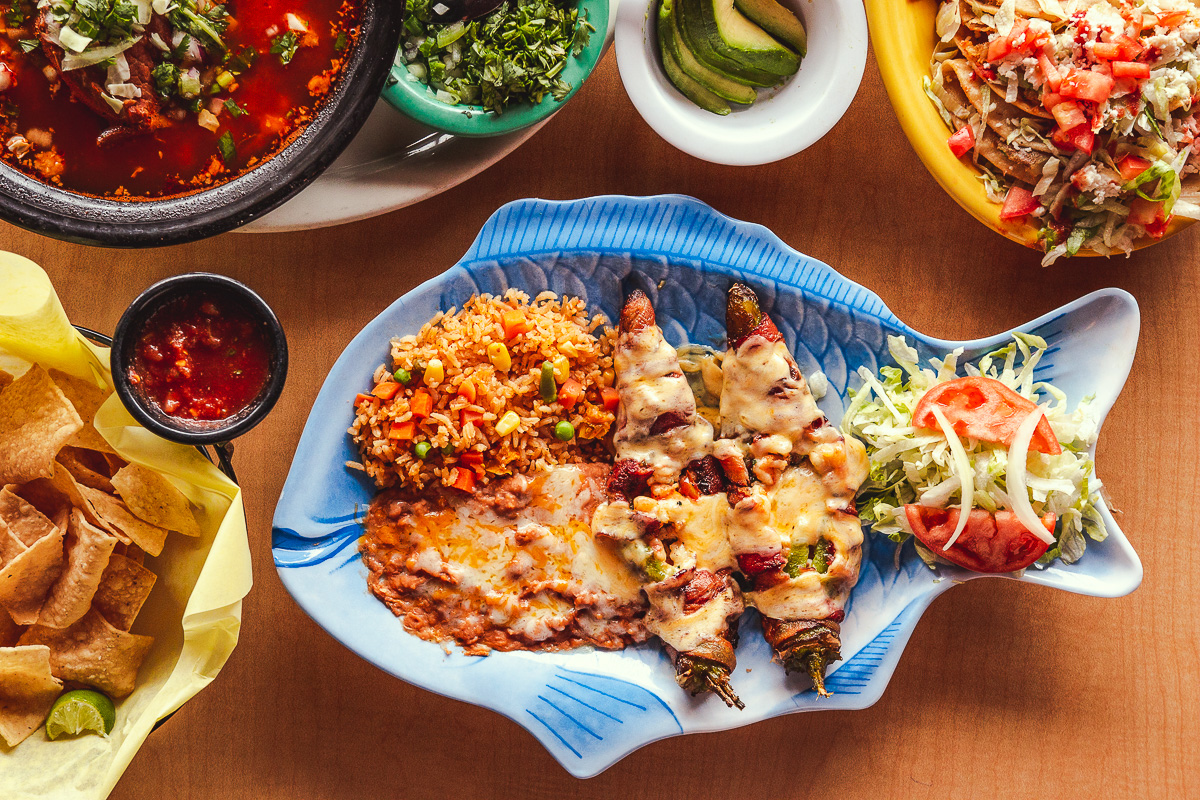
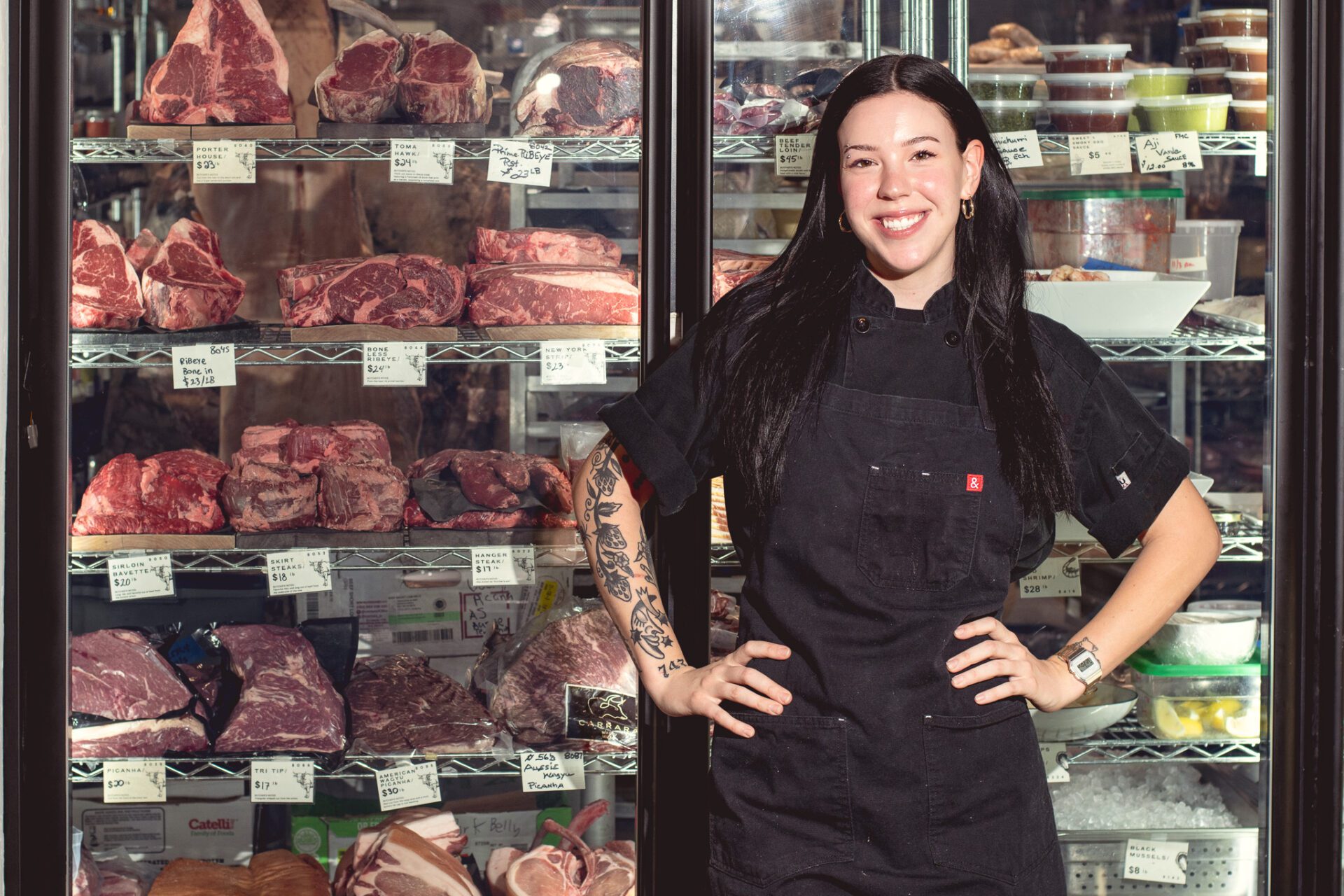
Mataya Phillips didn’t plan to become a chef. Like many in the industry, her path started with a detour. She moved to Tucson for college but took a gap year to work, falling into restaurants almost by instinct.
Her mother had worked in catering, and Phillips grew up learning to cook in commercial kitchens. At 15, she was catering weddings and falling in love with the emotions and energy of food-centered celebrations.
Now, Phillips is the executive chef at Forbes Meat Company, a butcher shop and brasserie in Tucson known for whole-animal butchery and a strong commitment to local sourcing. Her rise from line cook to sous chef to executive chef happened quickly but not without struggle. She cooked through the pandemic, found mentorship in Tucson kitchens, and eventually apprenticed in butchery under owner Ben Forbes. When he opened the restaurant, he handed her the reins with full confidence.
Phillips brings a clear culinary perspective to Forbes: keep it simple and let the ingredients speak. Working with some of the best beef and produce in southern Arizona, she favors restraint over complexity. She aims to preserve the integrity of each component, showcasing both flavor and sustainability.
At 25, she has already shaped a restaurant that reflects her values: technique-driven cooking, thoughtful sourcing, and a deep connection to community. She knows her regulars by name and works closely with local farms and ranchers. For her, food is also a relationship.
In this Q&A, Phillips talks about what drives her, the challenges she faced as a young chef, and why Tucson’s food scene feels like home. She also shares a few fun insights into her life beyond the kitchen.
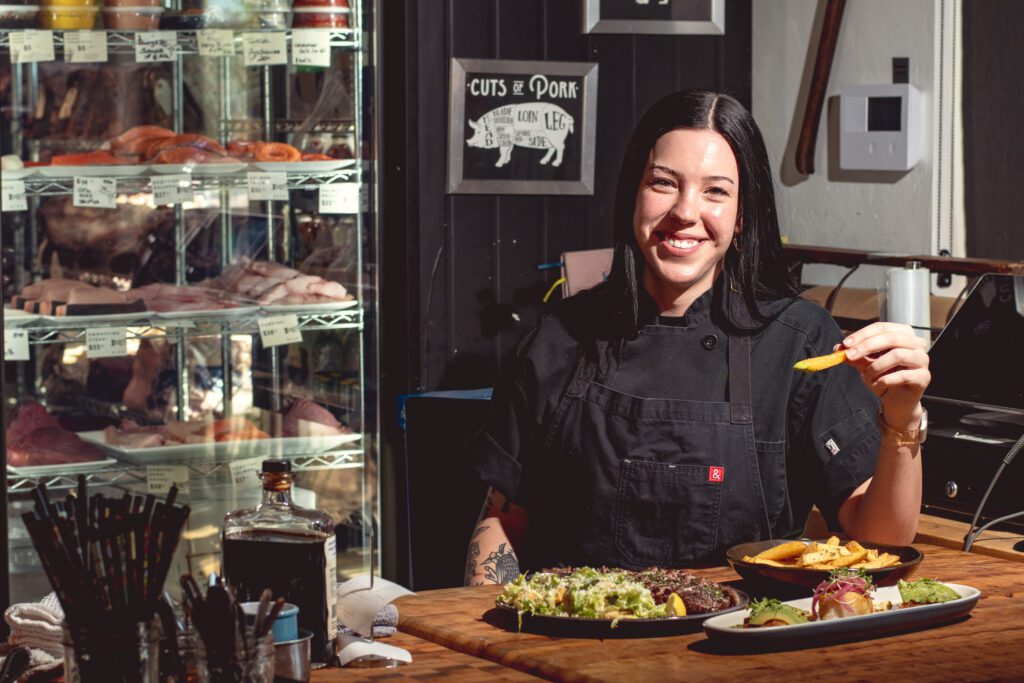
Can you tell us about your journey into the culinary world and what led you to become the chef at Forbes Meat Company?
Like many people I know in the industry, I fell into it mostly by mistake. I originally moved to Tucson to go to school, but I had to take a gap year to save money. I started working in restaurants because it was familiar to me; My mom worked for a catering company when I was growing up and they would use me as extra hands in the kitchen. I learned basic skills like making a roux, dicing vegetables, and baking bread in my trips to the commercial kitchen after school. When I turned 15 I got a job catering weddings and fell in love with it. I would get so emotionally invested that I would cry at most of them (lol.) It was never really about the food to me then, I just loved that I got to be a part of big moments in someone’s life- even if they were strangers.
When I found myself stuck in Tucson with no plan, it just felt easiest to do what I’ve always done and keep cooking. I worked in fast food restaurants and local casual places until Covid with no intention of becoming a chef. The first wave of the pandemic put most of my friends out of work but the restaurant industry kept pushing and I stayed in the kitchen 40+ hours a week. It was the only thing keeping me sane and I started to realize how much I loved it.
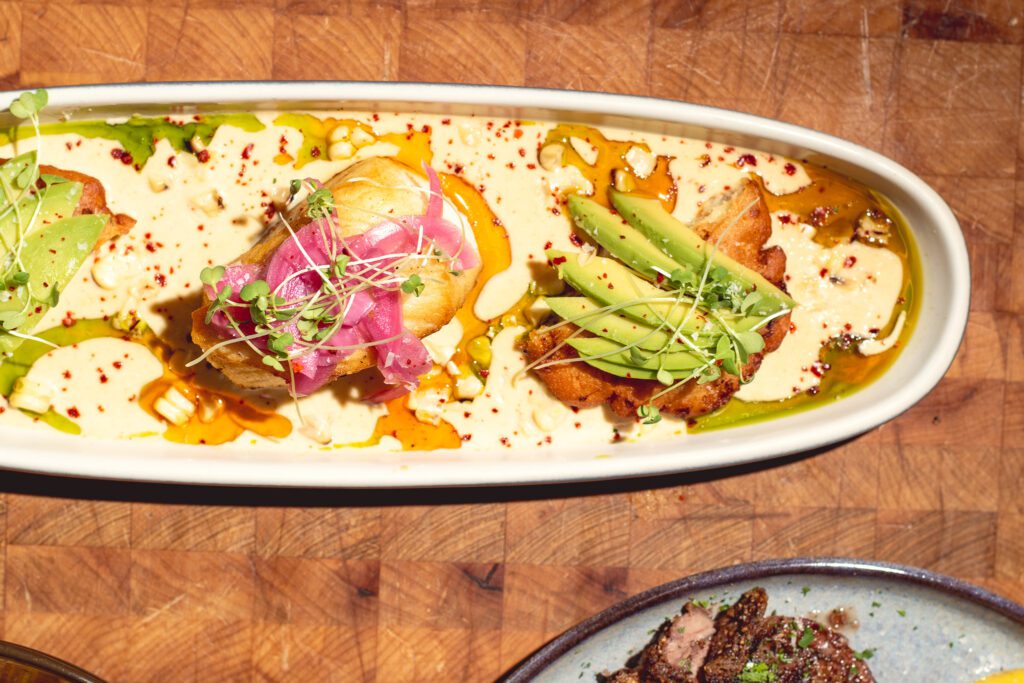
I started taking cooking seriously and went through a few different restaurants in town as a line cook. I became addicted to the feeling of getting through a tough service. I had a couple chefs that were so hard on me that I cried more days than I didn’t. I spent a few years line cooking and eventually became the sous chef at Commoner & Co. but I put so much pressure on myself and got burnt out fairly quickly.
By the time I met Ben Forbes, I was ready to leave the industry all together. I begged him to let me apprentice under him as a butcher and I’m extremely fortunate that he said yes. For nearly a year he taught me the ins and outs of whole animal butchery and sourcing food locally. I felt more passionate and driven than ever. I was completely unaware of his plans to open a restaurant until a few months before it happened. We worked together to set everything up and then he gave me complete control over the whole operation. It’s my first time being an executive chef so it’s been quite the challenging experience but I wouldn’t change a thing.
How would you describe your cooking style, especially when it comes to highlighting high-quality ingredients?
The incredible ingredients I have at my disposal every day have really shaped my style of cooking. I try to manipulate foods as little as possible and let the natural flavor of everything shine through. When you have the highest grade beef and locally sourced ingredients, you don’t want to cover that up. The more I’ve grown in the industry, the more I’ve started to appreciate simplicity. I don’t like to oversaturate plates with tons of garnishes or cook the life out of proteins. I think that preserving the nutrients of ingredients through gentle cooking is a value you can see through all the dishes I put out.
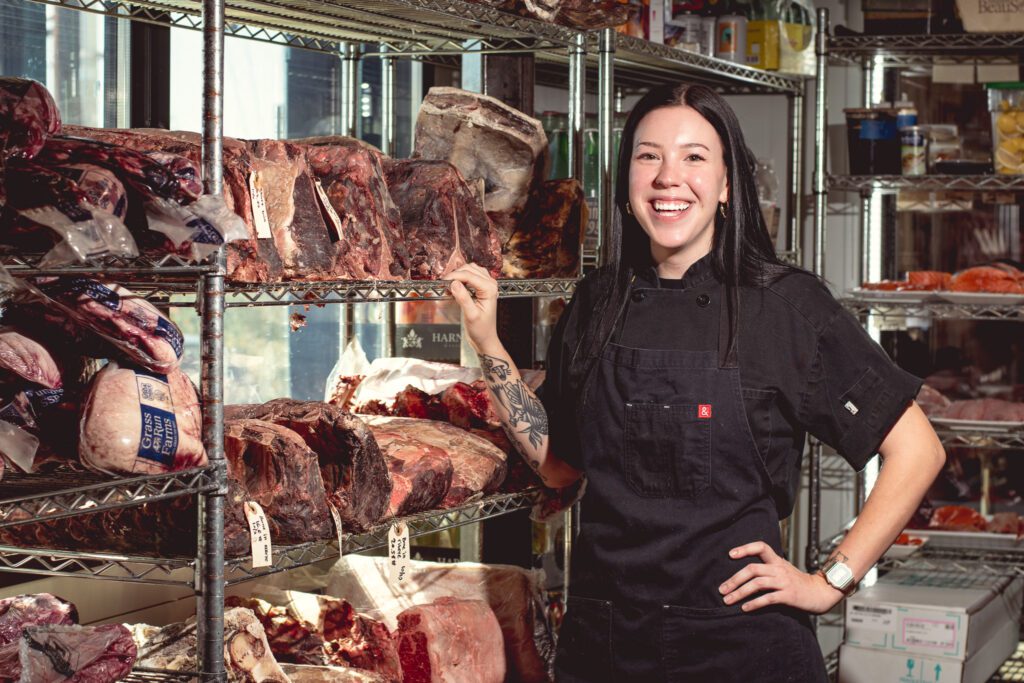
Forbes Meat Company is known for its whole-animal butchery and sustainable, community-focused approach. How do you incorporate those values into the dishes you create?
Working for Ben and so closely with whole animals has given me a huge appreciation for every part of the animal. We don’t let a piece of the animals we bring in go to waste and every day we find new ways to use them. We label obscure or “end-cuts” of meat as “Butcher’s Cuts” for our most popular dish, the steak frite, which reduces waste and brings the cost down for our customers. We use excess bones in stocks, beef trim for burger meat, and animal fats for countless different dishes. Sustainability is extremely important to me and we really do our part in reducing waste in an industry set up to produce it.
Ben has formed his own community through 7 years of selling meat in Tucson so I do my best to respect that and bring whatever they want to fruition. Our community is what has made us great and I listen to every bit of feedback they want to give me. At this point, I know nearly every person who regularly walks through our doors and I keep them in mind through every step of what I do.
Have you had any mentors or role models in the culinary world who have influenced your cooking style?
Reading Kitchen Confidential by Anthony Bourdain was what inspired me the most as a young line cook. I think that’s true for a lot of people but it would feel criminal to answer that question without mentioning it.
As for Tucson chefs, spending one night at Studio Janos working for Janos Wilder was more influential to me than years in other places. His methodical, calm nature mirrored everything I want to become. He showed simplicity through his 3-4 component dishes but every flavor was deep and well thought out. Plus, he’s just a very kind, genuine person and his dinners feel like a dinner party between friends. This inspired me to focus more on the light-hearted environment we create in the dining room at Forbes than my “cooking style” specifically.
I’m constantly inspired by other great chefs in Tucson who I’m lucky enough to see as my friends. Nick Creamer, my close friend and right hand man at Forbes has shown me the discipline it takes to be a great chef. Anthony Dromgoole, chef at Obon, trained me up in my young sous chef days and is the king of pretty plates. And Wyatt Carrizosa, chef at Sunshine Wine, is constantly putting out food that I adore and wish I would’ve thought of first.
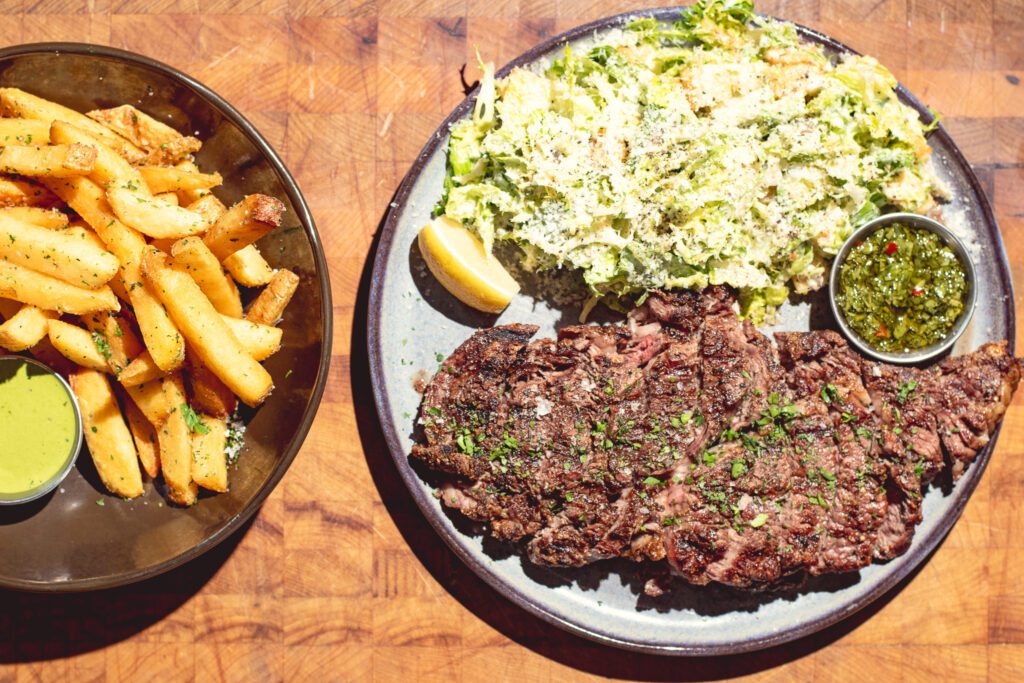
What has been one of the biggest challenges you’ve faced as a young chef, and how did you overcome it?
In the past it was difficult to have any authority over cooks who were older than me or had more experience than me. I felt uncomfortable giving direction so I would put the brunt of the hard work on myself. It took a long time to work through that feeling but the best blessing I’ve ever received is the team of cooks I have now. They’re a group of incredibly talented, kind-hearted, patient, hilarious cooks who don’t make me question if I’m fit to run the restaurant.
Forbes Meat Company often works with local farms and ranchers. Why is sourcing local ingredients important to you?
In a country where there’s almost a monopoly of food distributors (Sysco, US Foods, etc.) food is largely starting to come from the same places. Everyone is using similar ingredients and we’re all fighting for a way to make it our own. Buying food locally helps us stand out from this food chain but more importantly, it supports the people living in Tucson. We buy from people we know and help support their businesses. In turn, they come in and help us support ours. Buying food locally might be more expensive but the whole community benefits from those choices. We’re fortunate that a community of people who really care where their food is coming from has found us, largely through word of mouth, so we have the means to keep buying locally and supporting the ranchers and farmers we know and love.
Forbes Meat Company is located at 747 S. Sixth Ave. Keep up with Forbes Meat Company on Instagram. Follow Mataya Phillips on her cooking account @crudataya and her personal account @matcantdrive.
Love Tucson food? So do we. That’s why our stories are free to read — and focused on the chefs, farmers, and restaurants that make Tucson so delicious.
👉 Get exclusive perks & support local with the Foodie Insiders Club and learn how to eat local year-round.